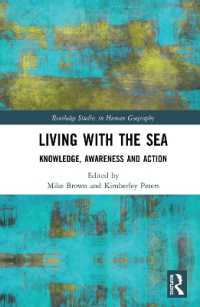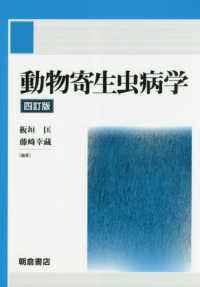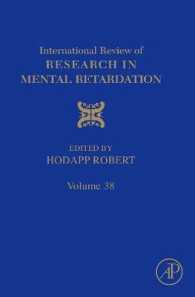Full Description
This scholarly research Handbook aggregates the broad-ranging, interdisciplinary, multidimensional strands of writing research from scholars worldwide and brings them together into a common intellectual space. This is the first such international compilation.
Now in its second edition, the Handbook inaugurates a wide scope of international research advancement, with attention to writing at all levels of schooling and in all life situations. It provides advanced surveys of scholarship on the histories of world and child writing and literacy; interconnections between writing, reading, and speech; digital writing; writing in communities; writing in the sciences and engineering; writing instruction and assessment; and writing and disability. A section on international measures for assessment of writing is a new addition to this compendium of research.
This Handbook serves as a comprehensive resource for scholars, graduate students, and advanced undergraduates in writing studies and rhetoric, composition, creative expression, education, and literacy studies.
Contents
Part I. A History of World Writing and Literacies 1. Origins and Forms of Writing 2. Drawings by Children between 3 and 4 Years of Age: Developmental Study of the Period of Form and Graphic-Symbolic Representation 3. History of Writing Technologies Redux 4. History of Typography 5. History of the Book 6. History of Schools and Writing Part II. Speaking and Writing 7. Transforming Speech into Writing: Constructing a Voice and Identity in Academic World Writing 8. Writing and Speaking Part III. Writing and Reading 9. The Writing-Reading Nexus: Authors and Their Audiences 10. Text Structure: Reading, Writing, Cross Language Perspectives Part IV. Writing Beginnings, Cognitive Processes and Self- Regulation 11. Writing in Early Childhood 12. Cognitive Account of the Development of Writing Skill: Cross-Language Evidence 13. Knowledge Building: Improving Ideas, Improving Writing 14. Self-Regulation of Writing: Models of Writing and the Role of Metacognition Part V. Unique Elements of Digital Writing: Linear and Non-Linear Multidimensional Contexts 15. When Writing is Produced with Keyboards: Unique Elements of Digital Writing Part VI. Intercultural Rhetoric Research 16. Intercultural Rhetoric Research in an Internationalizing World Part VII. Writing in Everyday Contexts 17. Drumming, Storytelling and Writing: Indigenous Safaliba Sign Making in Rural Ghana 18. Conceptualizing Everyday Writing Part VII. Educational Communities of Writing 19. Writer(s)-within-Community Model of Writing as a Lens for Studying the Teaching of Writing 20. Examining Genre: Negotiating Meanings in a Local Context Using a Dialogic and Sociocultural Approach 21. Research Writing as a Tool for Doctoral Students and Early Career Researchers' Development Part IX. Individual Uses of Written Language 22. The Bilingual Brain: Reading and Writing 23. Writing as Physical and Emotional Healing: An Umbrella Review of Meta-Analyses Part X. Students Who Are Deaf and with Autism Spectrum Disorder: Development of Writing 24. Language Deprivation and Teacher Positionality: Teaching Academic English to Deaf and Hard-of-Hearing Students 25. Writing and Autism Spectrum Disorder Part XI. Writing in the Sciences and Engineering 26. Learning Through Argumentative Writing on Scientific Topics 27. Written Communication in Engineering Work Part XII. The Emergence of the Desire to Write 28. Students Developing as Writers: How and Why Interest Makes a Difference 29. Motivation to Write Part XIII. Inspiration and Creativity in Writing 30. From Inspiration to Elaboration: Examining the Interrelationship between Creativity and Writing Part XIV. International Measures for the Assessment of Writing 31. Computational Measures of Linguistic Maturity in Writing 32. Brain Imaging Methods and Bilingual Readers and Writers 33. Reading: A Precondition for Writing 34. Assessment Measures in Reading that May Be Useful for Writing 35. Measuring Discovery Through Writing








